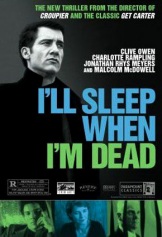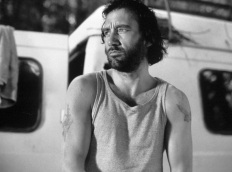| I'll Sleep When I'm Dead |
| |
 |
UK, 2003. Rated R. 102 minutes.
Cast:
Clive Owen, Jonathan Rhys Myers, Charlotte Rampling, Malcolm McDowell, Jamie Foreman, Ken Stott, Sylvia Syms, Alexander Morton
Writer: Trevor Preston
Original Music: Simon Fisher Turner
Cinematography: Mike Garfath
Producers: Mike Kaplan & Michael Corrente
Director: Mike Hodges
LINKS
|
 n 1971, it became officially cool to root for the bad guy (or, at least, the flawed guy). Clint Eastwood in Dirty Harry and Gene Hackman in The French Connection are the best remembered heroes from that year, but they weren't heroes at all. They were antiheroes—ruthless cops who stopped at nothing to get their man, even when it meant going outside the law. The burgeoning popularity of urban action thrillers devoid of good guys was further bolstered that year by a gritty British contribution from first-time director Mike Hodges. That movie was Get Carter, starring Michael Caine as a London mobster who returns home to Newcastle to avenge his brother's death.
n 1971, it became officially cool to root for the bad guy (or, at least, the flawed guy). Clint Eastwood in Dirty Harry and Gene Hackman in The French Connection are the best remembered heroes from that year, but they weren't heroes at all. They were antiheroes—ruthless cops who stopped at nothing to get their man, even when it meant going outside the law. The burgeoning popularity of urban action thrillers devoid of good guys was further bolstered that year by a gritty British contribution from first-time director Mike Hodges. That movie was Get Carter, starring Michael Caine as a London mobster who returns home to Newcastle to avenge his brother's death.
Hodges' first film was also his most noteworthy. After a couple more well-received pictures (Pulp, The Terminal Man), Hodges sank away from notice, re-emerging briefly with the campy Flash Gordon (1981), a movie whose box office success eventually led him to something called Morons from Outer Space (1985). Then, in 1998, Hodges made a comeback, returning to the crime genre with Croupier (1998), an extremely stylish noir starring the magnetic Clive Owen as a confident casino dealer who falls in with the wrong people.
Now Hodges returns even closer to his Get Carter origins with I'll Sleep When I'm Dead. Like Get Carter, Hodges' latest film features a man drawn back to his former life by the death of a family member and the thirst for revenge. To portray his antihero, Hodges again calls on Clive Owen, now a budding international star. Of him, Hodges has said, “Clive is the most precise actor I've worked with since Michael Caine. He also has an extensive knowledge of filmmaking and its rhythms.” It shows. Owen's Will Graham is a mysterious, uncommunicative protagonist who effortlessly controls the screen in his every scene—an Owen specialty.

Clive Owen lives in a van in the woods in I'll Sleep When I'm Dead. |
The film opens with Will living in self-imposed exile in a truck in the woods, where he works for a logging company called Farmwoods Tree Care (a little joke, no doubt). Meanwhile, in London, his younger brother Davey (Jonathan Rhys Meyers), a small-time drug dealer, has a run-in with Malcolm McDowell and winds up dead. Somehow Will intuits something's up and heads back to the Big City, where his frantic old friend Mickster (Jamie Foreman), his trigger-happy old crew, and his paranoid old nemesis Turner (Ken Stott) await. Also awaiting is Helen (Charlotte Rampling), an older woman with whom Will once had an unspecified relationship, probably romantic.
I'll Sleep When I'm Dead is the story of an exile who knows that if he returns home, he will most likely die, and does so anyway. It's not an uncommon story; one might even say it's archetypal. Indeed, Hodges shoots for larger meanings with such voiceover observations from Will as, “Most thoughts or memories are memories deceived.” I'll Sleep When I'm Dead also boast the smooth, stylish atmosphere that you'd expect from the maker of Get Carter and Croupier. Hodges cultivates a retro effect, in fact, right from the opening titles, done in a Sixties motif with spotlights on the credited names, while the rumbling undertones accompanying the piano soundtrack establish an unsettling mood.
Yet stylish filmmaking and philosophical musings can only disguise a lack of movement for so long. The trouble with I'll Sleep When I'm Dead is that it's already dead, particularly in the second half, when it becomes almost unbearably slow instead of speeding up to reach its climax. The movie is billed as a thriller, but Hodges paces it like a drama. As a drama, however, I'll Sleep When I'm Dead is vexingly vague. What thoughts or memories are memories deceived? Your guess is as good as mine. Why did Will leave the city? Some kind of a breakdown, apparently. Why does he now live in a van down by the river in the woods? Not clear. Why does he suddenly have an urge to reach out to his brother? He's psychic. How does he know to return to London? He's really psychic. Why do McDowell and his goons take out their frustrations on Davey? Even after McDowell's lengthy answer to a direct question, we don't know. McDowell is the film's antagonist, yet he lacks a clear goal. The story is murky, the stakes unclear, and Will an enigma. For character development, Hodges borrows from Unforgiven. Will refuses to have a drink with his old crew, because he doesn't drink anymore, but once he establishes who and what is behind Davey's death, a little alcohol becomes necessary to fortify the soul for the anti-climactic ass-whupping that must now be administered.
Still, with Owen as the epicenter, a lot can be forgiven. Since Croupier, Owen took a crucial role in the Oscar-nominated Gosford Park, a memorable cameo in the successful The Bourne Identity, and a lead role opposite Angelina Jolie in the high-profile flop Beyond Borders. Now we are about to see him as the titular hero of Antoine Fuqua's Bruckheimer-produced King Arthur. Owen is a mega-talent about to become a mega-star, and he is reason enough to see I'll Sleep When I'm Dead.
Review
© July 2004 by AboutFilm.Com and the author.
Images © 2004 Paramount Classics. All Rights Reserved.


